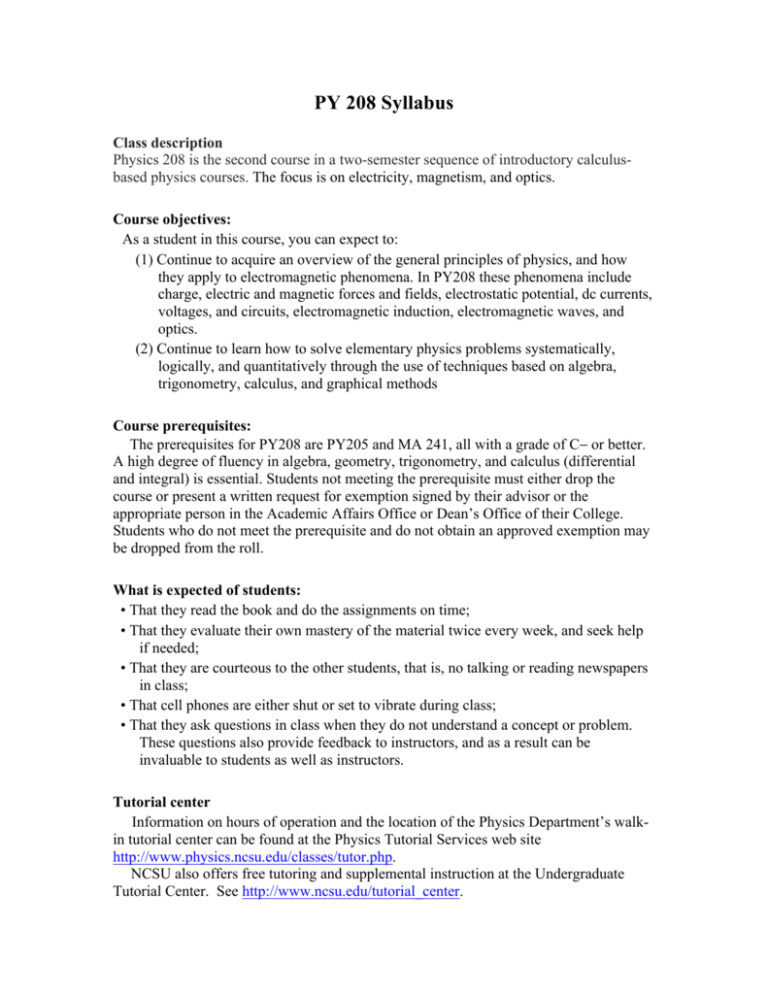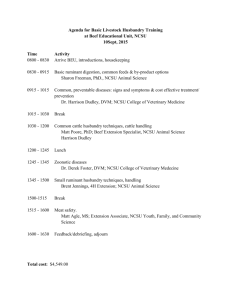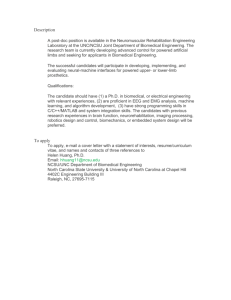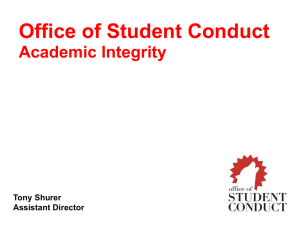
PY 208 Syllabus
Class description
Physics 208 is the second course in a two-semester sequence of introductory calculusbased physics courses. The focus is on electricity, magnetism, and optics.
Course objectives:
As a student in this course, you can expect to:
(1) Continue to acquire an overview of the general principles of physics, and how
they apply to electromagnetic phenomena. In PY208 these phenomena include
charge, electric and magnetic forces and fields, electrostatic potential, dc currents,
voltages, and circuits, electromagnetic induction, electromagnetic waves, and
optics.
(2) Continue to learn how to solve elementary physics problems systematically,
logically, and quantitatively through the use of techniques based on algebra,
trigonometry, calculus, and graphical methods
Course prerequisites:
The prerequisites for PY208 are PY205 and MA 241, all with a grade of C− or better.
A high degree of fluency in algebra, geometry, trigonometry, and calculus (differential
and integral) is essential. Students not meeting the prerequisite must either drop the
course or present a written request for exemption signed by their advisor or the
appropriate person in the Academic Affairs Office or Dean’s Office of their College.
Students who do not meet the prerequisite and do not obtain an approved exemption may
be dropped from the roll.
What is expected of students:
• That they read the book and do the assignments on time;
• That they evaluate their own mastery of the material twice every week, and seek help
if needed;
• That they are courteous to the other students, that is, no talking or reading newspapers
in class;
• That cell phones are either shut or set to vibrate during class;
• That they ask questions in class when they do not understand a concept or problem.
These questions also provide feedback to instructors, and as a result can be
invaluable to students as well as instructors.
Tutorial center
Information on hours of operation and the location of the Physics Department’s walkin tutorial center can be found at the Physics Tutorial Services web site
http://www.physics.ncsu.edu/classes/tutor.php.
NCSU also offers free tutoring and supplemental instruction at the Undergraduate
Tutorial Center. See http://www.ncsu.edu/tutorial_center.
Student learning objectives:
These list the topics that a student must know and be able to do to demonstrate mastery
of the material presented in this course. The Learning Objectives for each test and the
final exam will be posted on the Section web site prior to the first lecture of the sequence
leading to the next test and the final exam, and as such will serve as both a study outline
and a summary of items to review prior to the tests and final exam.
Required materials: textbook options and approximate costs:
WebAssign: Course PY 208
Textbook: Giancoli, Physics for Scientists and Engineers with
Modern Physics, Fourth Edition, Pearson/Prentice-Hall, ©
2009
Option 1: Full volume in hardcover (covers PY205 & PY208)
Option 2: Full volume in looseleaf (covers PY205 & PY208)
Option 3: Vol. 2 (covers PY 208 only)
These are NCSU Bookstore hardcover prices. Fixed time
electronic rental versions are also available through the
Bookstore following links at shop.bookstore.ncsu.edu. A
variety of other options are available on-line through other
vendors.
Clicker – Response Card NXT
Calculator
$29.95
$222
Used – $174
$151
$115
Used – $96.65
$50.00
….
Homework (WebAssign) information:
WebAssign homework assignments are due every week. You are normally allowed
three free submissions per question part. Additional submissions will incur a 25% penalty
per submission. (Example 4 submissions – 25%, 5 Submissions – 50%) It is therefore
important that you work each problem carefully on paper before submitting your
answers. This practice is vital to learning the material and will also help you when
reviewing the assignments before a test.
Homework Extensions:
You can request an automatic extension any time up to 2 days after the assignment is
due. Each extension (up to 2) will grant you 24 hours to work the unanswered problems
for a 50% deduction of all unanswered points. No additional submissions are available
under the extension policy.
Late assignments and incomplete grades:
Extensions will be granted on homework deadlines with excused absences. Partially
completed work will be given partial credit.
Tests:
Three 90-minute exams will be given on Tuesday nights during the problem session
time period. They will consist of 20 multiple-choice questions. Equation sheets will be
provided and available for viewing well before the test. Required materials for each test
are:
--a scientific calculator: no cell phones, ipods, or laptops
--NCSU Photo ID
--A number 2 Pencil
Scheduled makeup work:
There are no schedules makeup tests. Students with excused absences, in accordance with
the NCSU attendance policy, will be given options to correct the missed grade.
http://policies.ncsu.edu/regulation/reg-02-20-03
Attendance: Full participation in classes and examinations is expected of all students. Instructors in 100-­‐ and 200-­‐level courses must keep a record of attendance throughout the semester. Clickers will be used to track attendance. If your clicker does not work, if you forget your clicker, or your ResponseWare subscription has expired you will not receive attendance credit. Statement on academic integrity:
I am committed to upholding the University policy on academic integrity, as described in
the Code of Student Conduct. This Code can be found at
www.ncsu.edu/policies/student_services/student_discipline/POL11.35.1.php. See
especially Sec. 1 and Secs. 7 through 12. I expect students enrolled in this course also to
abide by University policy concerning academic integrity. In placing your name on any
paper (homework, test, final exam) to be graded, you affirm that you have neither given
nor received unauthorized aid on the work submitted. Should this not be the case, the
work will not be accepted and a grade of zero will be recorded. If you are caught cheating
on a test or exam, the minimum penalty will be a grade of F on the exam and the
maximum will be a grade of F in the course and any discipline handed down by Student
Conduct.
Statement for students with disabilities:
Reasonable accommodations will be made for students with verifiable disabilities.
To take advantage of available accommodations, students must register with the
Disability Services for Students at 1900 Student Health Center, Campus Box 7509, 5157653. For more information for both students and instructors on the policy of NC State
regarding students with disabilities, see
http://www.ncsu.edu/policies/academic_affairs/courses_undergrad/REG02.20.1.php.
Statement on extra expenses:
Beyond the purchase of the textbook, WebAssign access, a response card, and a
suitable calculator, there are no significant extra expenses.
Statement on transportation:
Not applicable
Class evaluations:
Online class evaluations will be available for students to complete at
https://classeval.ncsu.edu/. An Email reminder will be sent by NCSU as the time
approaches. All evaluations are confidential: instructors will not know how any one
student responded to any given question, and students will not be able to access the
ratings for any instructor. See classeval@ncsu.edu for assistance. More information can
be found at http://www.ncsu.edu/UPA/classeval/.
Other information relevant to the course:
Your instructor may post, FAQ’s, notes, or other study aids on the Section Web site
as the course progresses. You will be notified of these either in the lectures or by email.
Grading Schedule
How you will be evaluated
Component
Tests (3 @ 17% each)
Homework
In-Class Quizzes (7%) + Attendance (3%)
Final exam
Total
Weight
51%
14%
10%
25%
100%
Grade Schedule
Score
97−100
93−96.99
90−92.99
87−89.99
83−86.99
80−82.99
77−79.99
73−76.99
70−72.99
67−69.99
63−66.99
60−62.99
Grade
A+
A
A−
B+
B
B−
C+
C
C−
D+
D
D−







